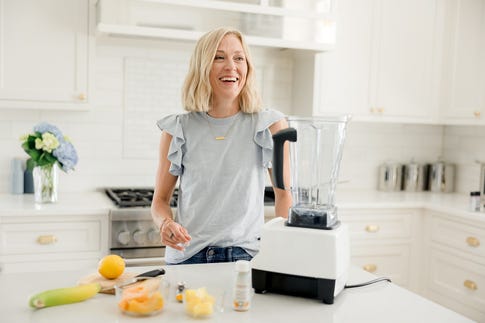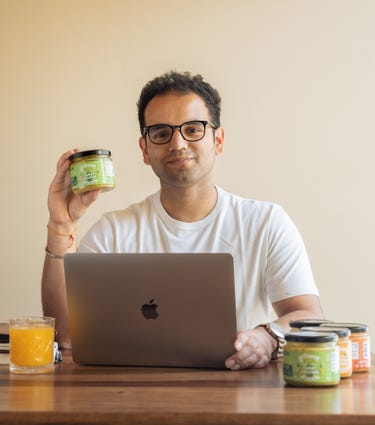Expo East Innovation Experience exhibitors share what it means to innovate
Three innovative brand founders discuss how they bring innovation to life in the natural and organic products industry.

What’s innovation in the natural products industry? Ask a dozen entrepreneurs, and you’ll find 12 different answers. For a manufacturer of gummy supplements, innovation could mean figuring out a novel method for improving bodily absorption of botanical ingredients. For a brand of meal replacement bars, innovation might revolve around leaning into AI for the sake of crafting formulations that offer nutritional excellence. And for a young company diving into the vegetarian burger market, innovation could simply hinge on intense recipe testing and the ingenuity to produce burgers with ideal texture and flavor.
Innovation dwells at the heart of the natural and organic products industry. Take a tour of a Natural Product Expo and witness hundreds of brands touting their advances on many fronts: unique formulations, new technologies, product niches that didn’t exist until the trailblazer brand launched and created a new zone of commercial and consumer activity. Every expo serves as a lively spectacle of the industry’s innovations.
This year New Hope Network is hosting Innovation Experience, an area inside this September’s Natural Products Expo East in Philadelphia (Sept. 20-23, 2023) that showcases innovation-rich brands. As we draw closer to the event, we turned to a trio of entrepreneurs exhibiting in Innovation Experience to find out what innovation means to them.
Leslie Danford, Vitaminis

When COVID-19 shut down the world, Leslie Danford was one of millions who lost her job during the prolonged crisis. Suddenly, she said, she was “thrust into this strange world—you are home, spending more time doing things you don’t normally do. Among other things, I was thinking a lot about making sure my family’s nutritional needs were being met during the pandemic.”
She had worked in the spirits industry but had always kept a list of companies on her computer that she wanted to launch. The pandemic compelled her to finally pursue a long-held dream and start a company—one that would bolster nutrition.
When Danford surveyed the supplements landscape she found many brands focusing on gummies, but she didn’t appreciate the sugar that often gets added to gummies. Nor did did she like the idea of getting her kids into the habit of eating candy, even if the ostensible goal was health. Juice brands incorporated functional ingredients such as ginger and, but these often require refrigeration, and Danford knew that the refrigerated beverage market is extremely challenging. Pills dominate the industry, but they always made her nauseous. She was also turned off by the frequent use of fillers in the manufacturing process.
So Danford, who is based in suburban Chicago, came up with the idea for Vitaminis—single-serve, 2 1/2 ounce shots of botanicals.
“I knew it had to be shelf stable, had to taste good, and had to have really clean ingredients with no added sugar,” she said. “I stuck to that vision.”
It wasn’t easy.
The companies she approached to manufacture the products had different ideas.
“You have to buck the trend with a lot of partners,” she said. “Formulators, for example, would send back products full of preservatives, dyes and flavors. They said you have to have these things. I kept pushing them and pushing them until we got back to the vision. But it’s tough. Everything in the system is made to operate a certain way.”
She persevered, and now crafts two products, Immune Support and Gut Health.
“I now laugh at the contracts I drew up when I approached formulators,” she said. “I need them and they don’t need me at all. You’re going around hat in hand to find someone to take a chance.”
To Danford, innovation represents pushing against norms.
“Why not?” she asked. “New flavors, new colors—to me that’s not the same kind of innovation as asking why not and pushing boundaries. It’s only when you are pushing boundaries that you come up with interesting things.”
But there is “inherent risk” with innovation, she said. “The true entrepreneur always has this question mark hanging over them. Somebody has to take that chance.”
Aman Blana, Growee Foods

Growing up in India, Aman Blana, the founder of sauce company Growee Foods, ate lots of vegetarian curries and other vegetable-forward dishes. And he’d often take the leftovers and slather them on toast or crackers for snacks. When he moved to Atlanta, he discovered that most commercial spreads were filled with sugars and artificial ingredients. And even the better ones relied on ingredients such as purees, rather than whole vegetables.
Blana decided to create spreads packed with whole ingredients—inspired by the curries he turned into spreads back in India.
“Why does snacking have to have so many ingredients?” he asked.
Sounds simple—just use whole ingredients. But turning so many bell peppers and zucchini into shelf-stable spreads was anything but easy. One big challenge was working with manufacturers. They exercised quite a bit of pushback when Blana approached them with recipes.
“They said, `You can’t do chunks of zucchini. You need puree,’” said Blana. “That was a big challenge.”
In India, he said, people use acacia gum as a food stabilizer and thickener. But most U.S. companies leverage xanthan gum, which is cheaper. Acacia gum, however, offers more health benefits and Blana wanted to stick with it. But manufacturers weren’t happy.
“They would say, `You must use xanthan gum. It’s much cheaper.,” he said. ��“Literally all manufacturers we approached pushed us to reject acacia gum, due to cost.”
He ignored them, and managed to persuade manufacturers to use his favored binder.
“Innovation to me means exploring more healthy ingredients, rather than modifying things chemically or modifying existing ingredients in the lab,” he said. “Bigger companies steer clear of our approach because they want something that is more recognizable to consumers. But it feels like innovating our way is a short-term challenge for a long-term gain. We are just focusing on the inherent benefits of the plant-based ingredients themselves.”
Amy Cohn, Joydays

Amy Cohn had devoted her career to running digital innovation for large companies like Disney and Oprah. But then about two and a half years ago, she was diagnosed with colon cancer, which was successfully treated. That experience propelled her away from working for big media conglomerates and, instead, starting a food company offering products that speak to a wide range of people with chronic diseases.
The cancer diagnosis, she said, “makes you understand what you eat, what you are marketed to, in a very different way.”
“I realized I needed to be eating in a way that is blood-sugar balanced—there are correlations between glucose spikes and chronic conditions, including cancer,” she said.
Once she decided to launch products that are sugar- and allergen-free, she then had to figure out what to make. The team asked diabetics what they most miss, and the answer was unanimous: cookies. So Joydays began R&D into creating a tasty and satisfying cookie. And Cohn, who grew up on a farm in Texas, wanted to create a cookie that would appeal to Middle America.
Joydays brought in a team of veterans from big companies, like Nabisco, Campbells and PepsiCo. All of them had backgrounds in baking. The team desired ingredients that are widely available commercially, to achieve both cost discipline and mass-market appeal. And Joydays also sought allergen-free ingredients.
“I had no idea a cookie would be this hard,” Cohn said. “We’ve had hundreds and hundreds of trials.”
Making the cookies taste sweet represented a principal challenge. She felt that many of the options out there—even natural ones such as stevia—broadcasted chemical flavors. They settled on monkfruit as one ingredient, but Cohn said its aftertaste was an issue.
“Dealing with natural sweeteners is a different ballgame,” she said. “In production, as you scale those things become even bigger challenges. There’s a higher concentration of sweetness in monkfruit, but you don’t want to use just that. If you balance it with allulose then you mimic the taste of sugar. But to get the balance, you are constantly making a percent change here, a percent change there.”
Nailing shelf stable also posed high hurdles. At first, shelf stability for Joydays cookies was 6 months. Now, it’s nine months. The company rejected using preservatives, so the team hunted for natural ingredients that can extend shelf life.
“In the food industry, people are always talking about innovation. And for me coming from tech, people there also always talk about innovation. I think the reality is that innovation is having a new perspective on something and thinking through things that might be disparate and might not seem to go together,” she said. “And then you merge them together and come up with something new.”
Read more about:
InnovationAbout the Author(s)
You May Also Like




